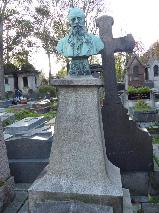Le Bon, Gustave |
| ANTHROPOLOGIST, PSYCHOLOGIST, SOCIOLOGIST (FRANCE) |
|
BORN 7 May 1841, Nogent-le-Rotrou, Eure-et-Loir - DIED 13 Dec 1931, Marnes-la-Coquette, Hauts-de-Seine BIRTH NAME Le Bon, Charles-Marie Gustave GRAVE LOCATION Paris: Père Lachaise, Rue du Repos 16 (division 89, avenue Aguado, ligne 09) |
|
Gustave le Bon was the son of Jean-Marie Charles Le Bon, who worked for the French government. Gustave studied medicine in Paris and qualified as a doctor in 1866. Instead of becoming a physician he started writing medical articles. He also learned himself English and German by reading Shakespeare in those languages. In 1868 he published a book on sexual reproduction. He joined the army during the Franco-Prussian War and witnessed the Paris Commune of 1871. From that time he was opposed to pacifists and protectionists. After the war he became interested in the new field of anthropology and he travelled widely in Europe, Asia and North-Africa. "Les Civilisations de l'Inde" was published in 1887. From 1890 he focussed on psychology and sociology and he also executed experiments in physics. In 1895 he published his best known work "Psychologie des Foules" that he dedicated to Théodule-Armand Ribot. In 1902 he started weekly lunches with prominent intellectuals, among them Paul Valéry, Henri and Raymond Poincaré, Marcellin Berthelot and Aristide Briand. In his "L'Évolution de la Matière" (1905) he foresaw mass-energy equivalence and in 1907 he predicted the atomic age in "L'Évolution des Forces". In 1908 he returned to philosophy. He continued to publish books and until 1920 he was Professor of Psychology and Allied Sciences in Paris. He received the Grand Cross of the Légion d'honneur in 1929. His last book was "Bases scientifiques d'une philosophie de l'histoire" (1931). He died in the same year. Related persons • met Poincaré, Henri |
Sources • Gustave Le Bon - Wikipedia (EN) |



